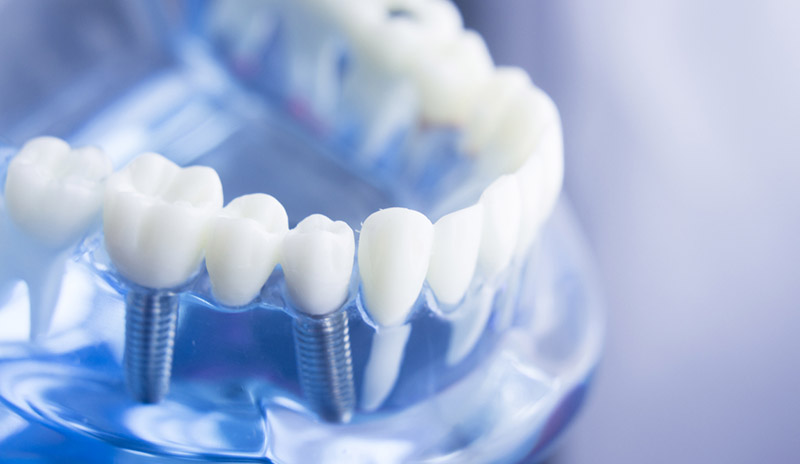Dental Implant Surgery
Here are the steps you can expect on the first day of the procedure:
- Anesthesia. A local anesthetic will be injected into the area that will be worked on. With this method, you will be awake for the procedure, but will not feel anything other than mild pressure. However, you can opt to be unconscious or have a stronger anesthesia that will leave you completely unaware of what’s happening if you are uncomfortable with that option.
- Prep the implant site. After the anesthesia is in effect, a small incision will be made to the gum where the implant will be placed. The next step is drilling a small hole, or osteotomy, into the jaw bone just below the gum line.
- Placing the implant. Once the drilled hole is wide enough, an alignment pin will be used to correctly place the implant. The incision will then be stitched up using dissolvable stitches and this portion of the procedure is complete.
After these steps, you will be sent home to begin the healing process. This can take anywhere between three to six months, depending on the patient. This allows for the implant to properly fuse to the bone. You will then see your dentist for the next step:
- Set the abutment. After being numbed with a local anesthetic, a small incision is made to expose the implant. The abutment, or the piece that connects the implant and the replacement tooth or crown, is then placed. Also, an impression is taken for your crown.
- Placing the crown. Once your crown is ready, the final step of the procedure is to place it over the abutment. Your dentist will securely screw the crown into the implant.
Healing Process
Your dentist will give you instruction on how to care for the implant site and practice the best oral hygiene to avoid infections, pain, and complications. It’s important to follow these steps completely so your implant stays in permanently and the process does not have to be repeated. These instructions may include specific brushing or flossing recommendations, special mouthwash, restricted diet, pain medication and regular checkups.
Potential Risks of Dental Implants
As with any dental surgery, complications can occur if the procedure is not done correctly or special circumstances prevent the expected outcome. Although rare, here are some complications to consider:
Infections
An infection of the dental implant, or peri-implantitis, will cause inflammation of the gums and bone surrounding the dental implant. This can lead to bone loss in the jaw bone, which is a major problem when it comes to supporting the dental implant. This infection is caused by bacteria being introduced to the surgical site, either during the procedure or the healing process. This complication happens more frequently with patients who neglect proper oral hygiene, smoke or use other tobacco products, have diabetes or suffer from a weak immune system.
Overloading
This sometimes occurs when the procedure is completed during one visit. It can result in the dental implant not properly fusing with the bone. The fusing step, or osseointegration, is the most crucial part of a successful dental implant and could fail if too much pressure is applied. Your dentist will know whether there should be a longer healing period between steps or if a temporary crown can be added right away at placement.
Allergic Reaction
Although a very rare occurrence, some patients are unaware of an allergy to titanium. If you suspect you might have a sensitivity to titanium, get tested before the surgery to avoid allergic complications after the procedure.
Schedule a Professional Consultation
If you’re interested in getting a dental implant to replace a missing tooth, you can schedule an in-depth consultation with one of our Reno dentists to confirm it’s the best option for you. Patients who are missing a higher number of teeth or who require a tooth to be extracted will usually benefit the most from this procedure.






















